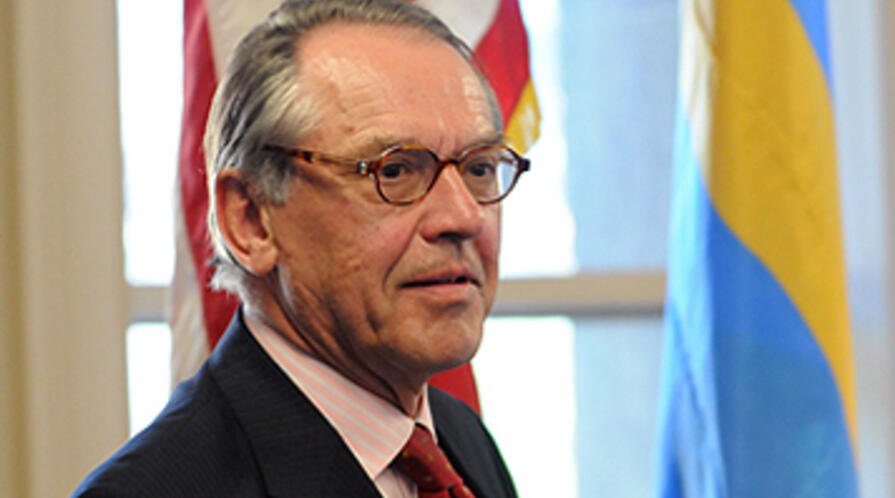Former U.N. Special Envoy to Darfur Jan Eliasson addresses global crisis management

Under the aegis of the Forum on Contemporary Europe, Ambassador Jan Eliasson, former U.N. Special Envoy to Darfur, visited Stanford and FSI to offer a new model for global crisis management of a wide range of issues, from piracy to global poverty. As the former president of the U.N. General Assembly, Eliasson called for concerted action by NATO, the European Union, the U.N., and other actors on pressing security and humanitarian issues. Arguing that current security and humanitarian challenges are greater than at any time in recent memory, Eliasson urged that world powers, along with international institutions, seek new leadership from the Obama administration grounded in recognition of the global impact of regional crises.
To make his case for seeing the global in the regional, Eliasson raised the specter of the escalating sea piracy off the coast of Somalia. Pirates in that region launch from the shores of a failed state – a polity that has degenerated into rival war-lord militias after combined forces of U.N. and Western powers lost their appetite for engagement, and turned their attention elsewhere. While much of the world is refocused on the wars in Iraq and Afghanistan, multinational corporations are increasingly subject to and pay out multi-million dollar ransoms for the release of ship crews and cargoes that include the world’s commercial arms shipments. The piracy has grown beyond instances of local plunder, into crime that threatens one of the most heavily trafficked shipping lanes between western and emerging markets. Merchant marine as well as naval fleets have been forced to change course, altering global transportation and security routes. Most recently, Eliasson’s call for international leadership would seem to have been heeded by nations attending the international summit in Brussels on the piracy crisis. At the summit, the E.U. foreign policy chief, the U.N. Secretary General, and U.S. officials joined with more than sixty countries – including Iraq – to pledge over $200 million in aid to the Somali government for security and development. This international cooperation, and attention to root causes, would seem to be the first sign of the kind of vision that Ambassador Eliasson urges for new and more comprehensive response.
Ambassador Eliasson completed his depiction of the most effective international policy responses with a focus on the world problem of poverty. Drawing on his years of experience in the international and Swedish diplomatic corps, Eliasson explained that in the most impoverished areas of the world, the most effective investment in international aid is that which funds the education of girls and young women. Teach a girl essential education, and she herself, along with her family, and her community, benefits in manifold ways. Raising his glass, Eliasson noted that great numbers of peoples still do not have access to cheap and clean water – an essential provision for health and development. Water, and access to its diminishing supply, must be understood by the world’s new leaders as the high stake behind multiple border wars.
The Forum hosted Ambassador Eliasson at FSI and Stanford for two days of talks to reach multiple audiences. At a Stanford Speakers Bureau event, Ambassador Eliasson addressed an overflow crowd of students and offered insights into the crisis in Darfur. The Forum welcomed the opportunity to bring Ambassador Eliasson, so recently from his mission in Darfur, to spur student interest in the role of international (U.N.) and regional (European Union and African Union) peace keeping operations. During the same visit to Stanford, the Forum on Contemporary Europe hosted Kerstin Eliasson, Board Member of the European Commission Joint Research Center, and former Assistant Undersecretary of the Swedish Ministry of Education and Science, to speak on research reforms in the European higher education system. Kerstin Eliasson’s public address was co-hosted with the Forum by the faculty seminar series of the Stanford Institute for Higher Education Research. The visit by Ambassador Eliasson, and Kerstin Eliasson, was a highlight of spring 2009 research and public dissemination of the Program on Sweden, Scandinavia, and the Baltic Region at the Forum on Contemporary Europe.
